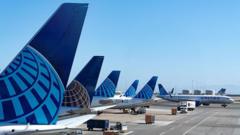The Trump administration has initiated a significant investigation into the imports of commercial aircraft, jet engines, and associated parts. This move, formalized on May 1, may result in additional tariffs impacting foreign aviation products, potentially altering the dynamics of the aerospace industry as it has previously seen considerable protections against foreign competition.
Led by the commerce secretary, Howard Lutnick, this investigation leverages the provisions of the Trade Expansion Act, which grants the president the authority to impose tariffs in the interest of national security. This latest inquiry is reflective of previous appropriations used by President Trump to impose tariffs on various sectors, including aluminum and steel.
The Commerce Department intends to gather insights from industry stakeholders regarding the domestic demand for aircraft and related parts, assessing whether national production can meet this demand and how foreign suppliers are integrated into the market. Moreover, the investigation will delve into governmental favoritism toward foreign manufacturers.
While the aerospace sector has historically maintained a trade surplus—predicted to reach approximately $125 billion this year, behind only the oil and gas sector—experts warn that instituting new tariffs could undermine this success. Tariffs could particularly strain specialized suppliers, many of whom are globally dispersed, with certain essential components sourced from limited manufacturers.
Eric Fanning, president of the Aerospace Industries Association, emphasized the importance of evaluating opportunities for boosting domestic supply chains while preserving the trade agreements that have fortified U.S. leadership in the aerospace industry. He highlighted the aerospace sector's crucial role in economic performance, job creation, and innovation.
Boeing, a key player in commercial aviation, recently commented that the impact of existing tariffs has been manageable yet voiced concerns regarding their effect on suppliers. However, the company maintains a forecast for recovering these tariffs in the pricing of sold aircraft. In contrast, engine manufacturer RTX estimated a cost of roughly $850 million this year due to existing tariffs, while GE Aerospace projected a toll of $500 million.
Historically, governments have employed tariffs and subsidies to protect their aviation sectors, leading to prolonged disputes over unfair practices between the United States and the European Union regarding states’ support of Boeing and Airbus. In 2021, both parties reached a resolution to work in tandem against China’s industrial dominance, ending a lengthy 17-year feud over subsidies.
As this investigation unfolds, stakeholders across the aerospace industry will be monitoring its implications closely, balancing the intent of protecting domestic production against potential disruptions due to tariff implementations.




















